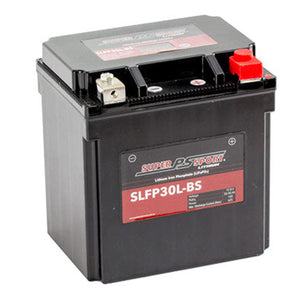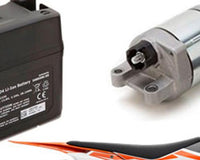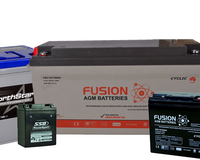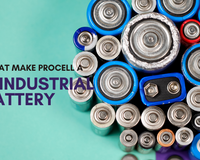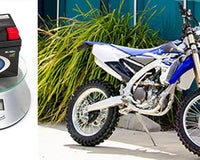Table of Contents
Lithium is a superior metal in battery chemistry because:
- It’s lightweight and easily malleable, so it can be used in a variety of applications.
- It’s highly reactive, enabling batteries to work faster with good energy density.
However, the reactivity of lithium is a double-edged sword because it means less stability and higher risk of the battery catching fire.
Enter lithium iron phosphate (LiFePO4) batteries—all the advantages of lithium chemistry minus the risks.
Let’s get into more detail about the LiFePO4—the best lithium battery.
What Are LiFePO4 Batteries?

LFP20HQ-BS Lightweight Lithium Ion Phosphate Motorcycle Battery
Lithium iron phosphate (LiFePO4) batteries are secondary, rechargeable batteries. They use lithium iron phosphate at the cathode and graphitic carbon combined with lithium at the anode to increase conductivity.
Lithium moves between the electrodes during the discharge and recharge cycles while the lithium salt-based electrolyte remains unchanged.
The nominal voltage of each cell is 3.2 V.
The cells can be connected in series for large voltage applications. For instance, you can find 12 V LiFePO4 batteries with four cells or 25.6 V batteries with eight cells.
What Makes LiFePO4 the Best vs Other Lithium Batteries?
Safer, Stable Chemistry
LifePO4 batteries are the safest lithium chemistry cells because the chemical composition is thermally stable with a strong olivine crystal structure.
The stability of the cells means that the battery:
- Can withstand extremely high temperatures without decomposing
- Isn’t susceptible to thermal runaway
Because of the absence of thermal runaway, the batteries perform well under harsh conditions. Even if the LiFePO4 battery is exposed to extreme temperatures, short-circuits, is punctured, or the vehicle crashes, there’s no risk of fire or explosion.
Environmental Friendly
For starters, LiFePO4 batteries are rechargeable with long cycle lives, usually between 2,000 and 5,000, depending on the brand. This means you’ll need fewer batteries.
Note: Lead-acid batteries last for up to 400 cycles, while other lithium batteries give 1,000 cycles on average.
Secondly, lithium iron phosphate cells are less prone to gassing, so are unlikely to leak.
Note: Gassing refers to the release of gas from the cell’s electrodes which occurs during self-discharge or because of the electrolysis of water which happens when you charge the batteries.
In addition, phosphorus and iron are non-toxic and don't produce hazardous fumes, unlike lead, nickel oxide and cadmium.
Finally, the battery is fully recyclable, so all the materials used for the electrodes, casing and wiring are recoverable.
Excellent Efficiency
LiFePO4 cells are highly efficient with the following key features:
- The batteries are fast charging. It takes under 2 hours to reach full charge.
- They have a low rate of self-discharge at approximately 2% per month.
- They have a long runtime of 10 years or more when used correctly.
- They provide consistent power throughout the battery’s life.
- There is no memory effect, which means you can charge them to below full capacity without affecting your battery.
- There’s no maintenance necessary to keep the cells up and running.
- They’re easy to charge. The stable chemistry allows the cells to accept charge even from lead-acid chargers.
- They are compact and lightweight. (50% lighter than lithium manganese oxide cells and 70% lighter than lead-acid batteries).
Incredibly Versatile
There’s a lithium iron phosphate battery for every application:
- Kayaks and fishing boats. Faster charging speed and long runtime gives you more time on the water. The lightweight batteries also allow easier manoeuvring and speed.
- Motorcycles, mopeds and scooters. Less weight makes for faster acceleration. The lack of memory effect means you can charge the battery to whatever capacity for those impromptu trips without worrying about affecting your battery.
- Solar systems. The lightweight LiFePO4 batteries allow for easy setup. Plus, they last so long that you can go off-grid with a reliable, long-lasting power source.
- Industrial uses such as floor machines and liftgates. LiFePO4 are efficient and safe, making them suitable for use in warehouses and industrial sites.
- Household equipment such as flashlights and radio equipment. Since there’s no need for maintenance, they are easy to use at home to provide consistent, long-lasting power.
- Vehicles. Less battery weight translates to fuel savings and faster speed.
Choosing Your LiFePO4 Battery
There are several manufacturers of lithium iron phosphate batteries, each with their own methods of putting them together.
While all LiFePO4s outclass other lithium batteries in terms of superior safety and efficiency, those manufacturer-specific differences will affect how your battery works.
The table below shows what you need to consider when choosing your battery.
| Consideration | Decision Criteria | Preferred Option |
| Voltage | Battery voltage should match the device; for instance, you need about 12 V for car and boat batteries | Depends on use |
| Energy Density | Higher energy densities mean more power per given weight | 90–120 Wh/kg |
| Charge Rate | Faster charging options will allow full use of your machine with less downtime | Maximum 2 hours |
| Operating Temperature Range | The wider the temperature range, the better | -20–60°C |
| Service Life | More charge/discharge cycles give you a longer useful life | Minimum 1,000 cycles |
Apart from the technical aspects, choose a manufacturer with a longer warranty and a battery management system so you can get the best quality.
Take a look at some options below:
|
|
|
|
|
|
Buy the Best Lithium Battery in Australia
Get your batteries from HBPlus Battery Specialists where you’ll find a variety of LiFePO4 brands.
Get in touch if you need help figuring out which battery you need for your specific machines.
Simply dial +61 3 9770 8235 and our service team will be more than happy to provide advice and support. You can also drop us a note via our contact form and we’ll get back to you. Alternatively, use the chat option on our website for all your queries.
Bottom line, we are here to serve you.
Frequently Asked Questions
Is LiFePO4 the same as lithium-ion?
Lithium iron phosphate is a type of lithium-ion battery with longer life and more advanced safety features.
Are LiFePO4 batteries more expensive than other lithium batteries?
Their complex chemistry makes them more costly to produce. However, both phosphate and iron are readily available and cheap to extract, so the prices are still within a reasonable and reachable level.
They are slightly more expensive up front, but they last so long they work out cheaper in the long run.
What is the life expectancy of LiFePO4 batteries?
Lithium batteries last between 1,000 and 5,000 cycles depending on the brand and size, so they give ten years or more of useful life. Even after their initial life cycles, they still provide about 70% capacity.
Can LiFePO4 catch fire?
As a result of the chemical bonds that hold the oxygen within the LiFePO4 molecule, there is no risk of the cells overheating or bursting into flames as other lithium cells would.







